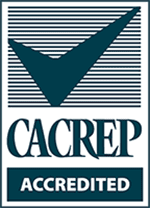Program Perspective on Faith and Spirituality in Counseling
Trinity Christian College is a liberal arts college grounded in the Christian faith. Our approach to learning and formation is influenced by a Reformed Christian tradition which endorses the perspective that “those who teach and learn are called to be coworkers with Christ in subjecting all cultural activities to the reign of God, and that genuine education must involve the whole person as a thinking, feeling, and believing creature (TCC Mission Statement).” The CMHC program engages a Christian perspective in the training of counselors. Using this framework, we explore how the process of counseling offers all people opportunities for healing and flourishing. Part of our work in counseling is attending to the role of faith and spirituality in our own lives and the lives of our clients. Our program relies on four guiding questions in designing learning experiences for students aimed at developing their competence in working with issues of spirituality and faith:
- How does counseling fit into a Christian Worldview?
- How should counselors integrate spirituality into ethical practice?
- How do I understand my own faith perspective and its interaction with others around me?
- What are the nuts and bolts of how to talk about faith and spirituality with clients?
At the conclusion of the CMHC program students will demonstrate the ability to integrate a faith perspective into the practice of counseling.
Graduates of the CMHC program at Trinity Christian College will:
- Articulate a professional identity as a Clinical Mental Health Counselor within the broader field of mental health practice.
- Demonstrate the ability to integrate a faith perspective into the practice of counseling.
- Demonstrate knowledge in the core counseling areas including ethics, multiculturalism, human development, career development, helping relationships, group work, assessment, and research.
- Develop case conceptualizations resulting in treatment plans that integrate theoretical perspectives in counseling, research-based approaches, ethical decision-making, and social justice advocacy.
- Deliver competent mental health services which attend to the developmental, multicultural, relational, and spiritual concerns of clients.


